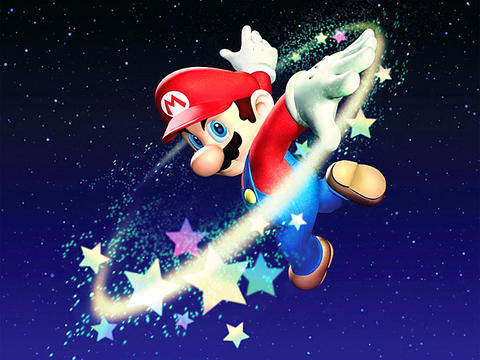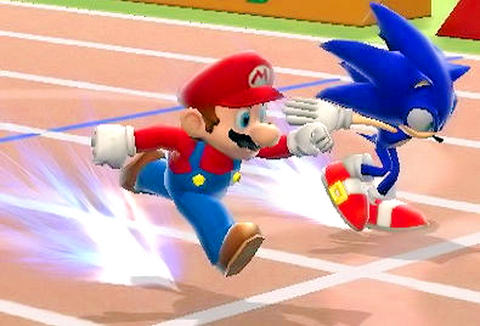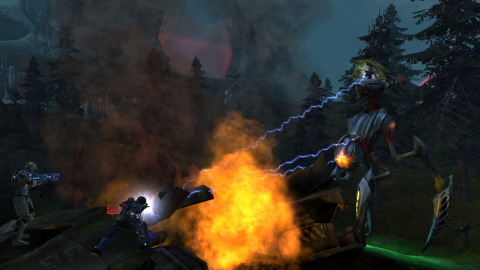After selling almost 200 million games over more than two decades and generating untold billions of US dollars in revenue for Nintendo of Japan, Mario is back with two new games. Super Mario Galaxy, released this month for Nintendo's Wii console, is the first major new Mario game in five years. Also, Mario shares top billing with his longtime rival Sonic the Hedgehog in a separate new game, Mario & Sonic at the Olympic Games.
Mario has always starred in games for everyone. So to test whether it could still appeal to an overeducated, media-saturated audience, I assembled a panel of non-gaming yuppies in their 30s at my house last weekend, put the Wii controls in their hands and sat back to check the reaction.
Judging by the hours of giggles, chortles and guffaws, Mario still has the goods and that incessant tug to play just five more minutes.

The reaction in my living room and elsewhere around the world indicates that Super Mario Galaxy is more than a worthy successor to the franchise's considerable legacy of smiles. It is being widely hailed as the best game yet for the Wii and is drawing plaudits from gamers and magazines alike.
Super Mario is generally a single-player game, but in a nice innovation, a second player can jump in and use a Wii remote to control a separate cursor on the screen that can stun enemies, pick up treasure and otherwise assist the main user controlling Mario. The game's whole feel is so finely tuned, so infectiously enjoyable, that it's understandable why Shigeru Miyamoto, Mario's creator, has been one of the most famous game designers in the world for decades.
My panel of non-experts had a lot of fun with the game's Olympic "events" (up to four can play at one time), especially the trampoline, but that game still is not receiving the praise being lavished on Super Mario Galaxy.

Richard Garriott's Tabula Rasa is another new game in an old series. How does it stack up?
The thing to understand is that playing a "massively multiplayer" online game, or MMO, is a commitment of money and time. MMO players routinely spend hundreds or even thousands of hours on their favorite games over many years. All of that time is an investment in building up the powers and abilities of one's virtual identity, not to mention the fun of adventuring with friends. For all that, players generally spend around US$15 a month.
Tabula Rasa is certainly a lot of fun, and it looks great. In an online gaming market deluged with dragons and elves, its fast-paced science-fiction combat is a refreshing change of pace. There are aliens descending all over the place and firefights stretching over gorgeously rendered landscapes.

Graphically, the game seems to take a page from Starship Troopers, with its bright colors and varied foes.
The big question is whether the game has enough depth to keep players coming back for months or years without devolving into a mindless repetition of "see alien, shoot gun, repeat."
Garriott and the rest of his team at NCsoft have been candid in saying that they are trying to appeal mostly to a broad base of casual gamers rather than to the smaller cadre of hard-core players who might spend 30 hours a week or more on a game.

More than four years after its debut, Eve Online is only now hitting its stride as one of the most interesting games in the world.
Eve takes place in a fictional galaxy in a far future, where humanity has splintered into four competing factions, the theocratic Amarr, the militaristic Caldari, the liberal Gallente and the rebel Minmatar. Players choose a side and find their own path.
At a stage when most games have long since stagnated, Eve continues to grow, recently passing 200,000 subscribers. CCP is planning a major graphics overhaul scheduled for Wednesday.
In many ways, Eve is like the real world. All 200,000 of Eve's players exist in one huge virtual galaxy spanning thousands of solar systems. About 40 percent of Eve's players are European, another 40 percent are North American and about 20 percent are from other continents. They all share one polyglot community around the clock, and at any moment tens of thousands of users are logged on.
More important, the economy and politics of Eve are almost entirely driven by the players themselves.
The most compelling aspect of Eve is that once players control a region of virtual space, they bear the responsibility of policing it, setting taxes, establishing diplomatic relations with neighboring groups and waging battles to protect their territory or take more. In most online games, the advanced content involves getting together with a few dozen friends to battle computer-controlled dragons and demons. In Eve, major battles involve hundreds of players fighting in starships in vast Star Wars-like firefights.

That US assistance was a model for Taiwan’s spectacular development success was early recognized by policymakers and analysts. In a report to the US Congress for the fiscal year 1962, former President John F. Kennedy noted Taiwan’s “rapid economic growth,” was “producing a substantial net gain in living.” Kennedy had a stake in Taiwan’s achievements and the US’ official development assistance (ODA) in general: In September 1961, his entreaty to make the 1960s a “decade of development,” and an accompanying proposal for dedicated legislation to this end, had been formalized by congressional passage of the Foreign Assistance Act. Two

March 31 to April 6 On May 13, 1950, National Taiwan University Hospital otolaryngologist Su You-peng (蘇友鵬) was summoned to the director’s office. He thought someone had complained about him practicing the violin at night, but when he entered the room, he knew something was terribly wrong. He saw several burly men who appeared to be government secret agents, and three other resident doctors: internist Hsu Chiang (許強), dermatologist Hu Pao-chen (胡寶珍) and ophthalmologist Hu Hsin-lin (胡鑫麟). They were handcuffed, herded onto two jeeps and taken to the Secrecy Bureau (保密局) for questioning. Su was still in his doctor’s robes at

Last week the Democratic Progressive Party (DPP) said that the budget cuts voted for by the China-aligned parties in the legislature, are intended to force the DPP to hike electricity rates. The public would then blame it for the rate hike. It’s fairly clear that the first part of that is correct. Slashing the budget of state-run Taiwan Power Co (Taipower, 台電) is a move intended to cause discontent with the DPP when electricity rates go up. Taipower’s debt, NT$422.9 billion (US$12.78 billion), is one of the numerous permanent crises created by the nation’s construction-industrial state and the developmentalist mentality it

Experts say that the devastating earthquake in Myanmar on Friday was likely the strongest to hit the country in decades, with disaster modeling suggesting thousands could be dead. Automatic assessments from the US Geological Survey (USGS) said the shallow 7.7-magnitude quake northwest of the central Myanmar city of Sagaing triggered a red alert for shaking-related fatalities and economic losses. “High casualties and extensive damage are probable and the disaster is likely widespread,” it said, locating the epicentre near the central Myanmar city of Mandalay, home to more than a million people. Myanmar’s ruling junta said on Saturday morning that the number killed had